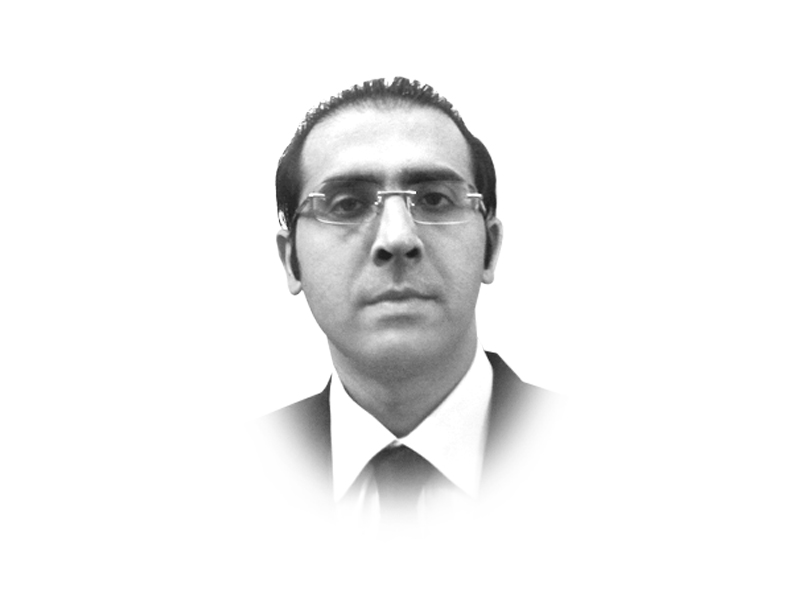
Mian Sahib along with being the prime minister, saving up on precious resources, is also the foreign and defence minister. Good intentions are not a substitute for a foreign or counterterrorism policy. We have arrived at a consensus that everything has to be fixed before anything is fixed. It is the era of the generalist, who can as easily talk for 10 minutes on the women cricket team as on thermal power. The academic has no similar entertainment value. Everything here is connected with everything else. Each argument is an overarching narrative ideological argument. Looking at the big picture is extremely important, however, the picture is not to be stretched so far that sight of the centre is lost.
Ideological battles are important and we find ourselves in an ‘existential’ one right now. However, outrage and lament are no policies. At least on some issues, the small stuff has to be sweated. Priorities need to be aligned. One gunman in Islamabad got more media space and attention in a week than Balochistan gets in the entire year. That is bad, right? Actually, worse, all the attention still missed the basic points, which sound bites and ticker size analysis often do, while much pontification has been done on how the SSP should have acted and how the police failed or not in the duty to maintain law and order, etc. Almost all the ‘experts’ seem to have missed that the Police Order, 2002 and the previous local government law have never been applicable to Islamabad. The Capital Territory still has Deputy Commissioner (DC) (not the District Coordination office (DCO)) who is also the District Magistrate and responsible for Law and Order not the SSP (whose is not a City Police office (CPO)). The DC should have been the one coordinating, leading and being ultimately responsible for the episode. While analysis of how this symbolises the failure of the state and the war on terror was being done, nobody looked this up, at least for asking the right questions, having the right framework of analysis.
Specifics are not enchanting. Reforms are boring, advocating incremental changes doesn’t bring ratings. The prevailing policy is to reject everything, advocate from outside the system and wait for the ‘revolution’. Let us take death penalty as exhibit A. To be for or against the death penalty is an ideological position. However, once the choice is made, the decision of how to fight is a practical one. As someone who is against the death penalty, the present strategy may seem well meaning, yet particularly ‘romantic’, which is to do public advocacy up to the point that the state and society are ready to do away with the death penalty. Extremely important, yet it presumes societal consensus as a prerequisite to structural/legislative change and that it is a one-way street. The tinkering of the system is nut and bolt stuff and it shapes the societal and state consensus as it is also shaped by it. Hence, to wait for the Islamic punishment of death to be scrapped is to be prepared for a very long wait. Section 302 (b) of the Pakistan Penal Code (the PPC by the way was originally drafted in 1860) under which the majority death sentences are awarded stipulates either life imprisonment or death for the offence of murder. The Pakistani jurisprudence position is that while death is the ‘default’ punishment, life imprisonment will only exceptionally be granted if ‘mitigating’ circumstances are proved. Asking for the punishment of death to be made redundant is, perhaps, too ambitious given our situation. However, using established legal principles, arguments can be made in courts to change the default punishment to life imprisonment and ‘aggravating’ circumstances be proved to mandate death the ‘rarest of the rare’ principle as established in other jurisdictions. So, while one remains firmly ideologically anti-capital punishment, one also makes peace with the fact that there will be death sentences, just a lot less of them. Lesser death sentences can reduce the social acceptability gradually (coupled with public advocacy) and by a process of attrition, you may come to a point where a final push can be made to have it abolished or else, of course, wait for the revolution. Not the most ideologically fulfilling position, yet the doable position. Baby steps are not exciting, just necessary.
The trial courts acquit a large number of terror suspects. It is more fashionable to think that the trial court judges (all of them) are closet Taliban than the mundane issues of understanding and revamping the prosecution service, the evidence act and the criminal procedure code, etc. Suo Motu is an unjustified power, yet a constitutional one. The advocacy should be geared towards the court articulating clear guidelines and parameters and then holding the court to that standard, so there is less arbitrary exercise of power. Judicial reform, like any other reform, will have to start small and specific.
Similarly, on the less ideologically contentious positions like corruption or democracy, we will not will them away or outrage them into being fixed. An effective Right of Information Act is an example of how you begin eroding the systemic problem of corruption. Everybody wants democracy, right (almost everybody), then how does the loony Sikander get more airtime than the new proposed local government ordinances combined? Where are the critical and informed media programmes on why the Punjab government seeks to revert to Zia’s non-party system? Balochistan will not be peaceful by Mian Sahib being up all night. Along with redressing historical wrongs, reining in the establishment and building trust, the demarcation of B area (which is most of the province and the division between A and B areas in Balochistan originally made in 1883) also needs to be revisited; at least the conversation held. There is no debate on land reforms, zilch. The Civil Service will not reform itself. Children out of school is not an ideological question, it is a policy failure, etc.
Political polemic has a lot of value and is tempting (your humble servant being a serial and incorrigible offender). Yet, it is important that Mian Sahib and all of us do not miss the trees for the woods. Sprinters are glamorous, yet the Olympics still needs the marathon runners. Let us chip off some miles before we launch into the home stretch. There is small stuff to be done
Published in The Express Tribune, August 25th, 2013.
Like Opinion & Editorial on Facebook, follow @ETOpEd on Twitter to receive all updates on all our daily pieces.
COMMENTS (6)
Comments are moderated and generally will be posted if they are on-topic and not abusive.
For more information, please see our Comments FAQ




1732626034-0/BeFunky-collage-(92)1732626034-0-165x106.webp)







Brilliant OpEd. The absence of comments proves your hypothesis. Specific are not glamorous or interesting enough.
Your words fall on deaf ears. We are in for some serious crap! We reap what we sow. We are a dumb nation.
A timely and pragmatic Op Ed by ET, thanks for that. It is intriguing to see rightwing leader NS and his party playing with death penalty. Ideologically they are for not against death penalty as opposed to secular parties which have put an end to it. Yet NS wants to continue this stay and Taliban leaders openly appreciated that! In fact most rightwing parties including people in NS party celebrated death penalties in the past. Pakistan is not a nation but several nations. Each nationality has elected their own separate party in their area of influence. In addition when they are out of govt they talk about solving all problems in a few months and days. When in power their whole tone becomes like they are still in opposition! We love to hear lies and false promises and that is why they do what they do.
That was good sound advise for our Prime Minister, but unfortunately there are many others advising him who are well aware of his short-comings and we have yet to see a leader who is immune to sycophancy...............and there in lies our real problem.